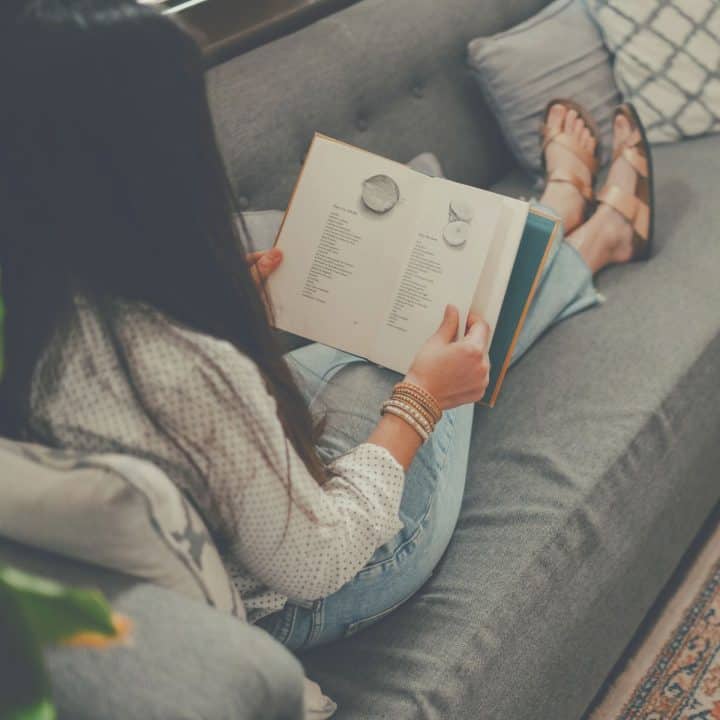The benefits of puzzles are surprising. The benefits of puzzling and the art of 'getting lost in the zone' are good for your brain, life, and health.
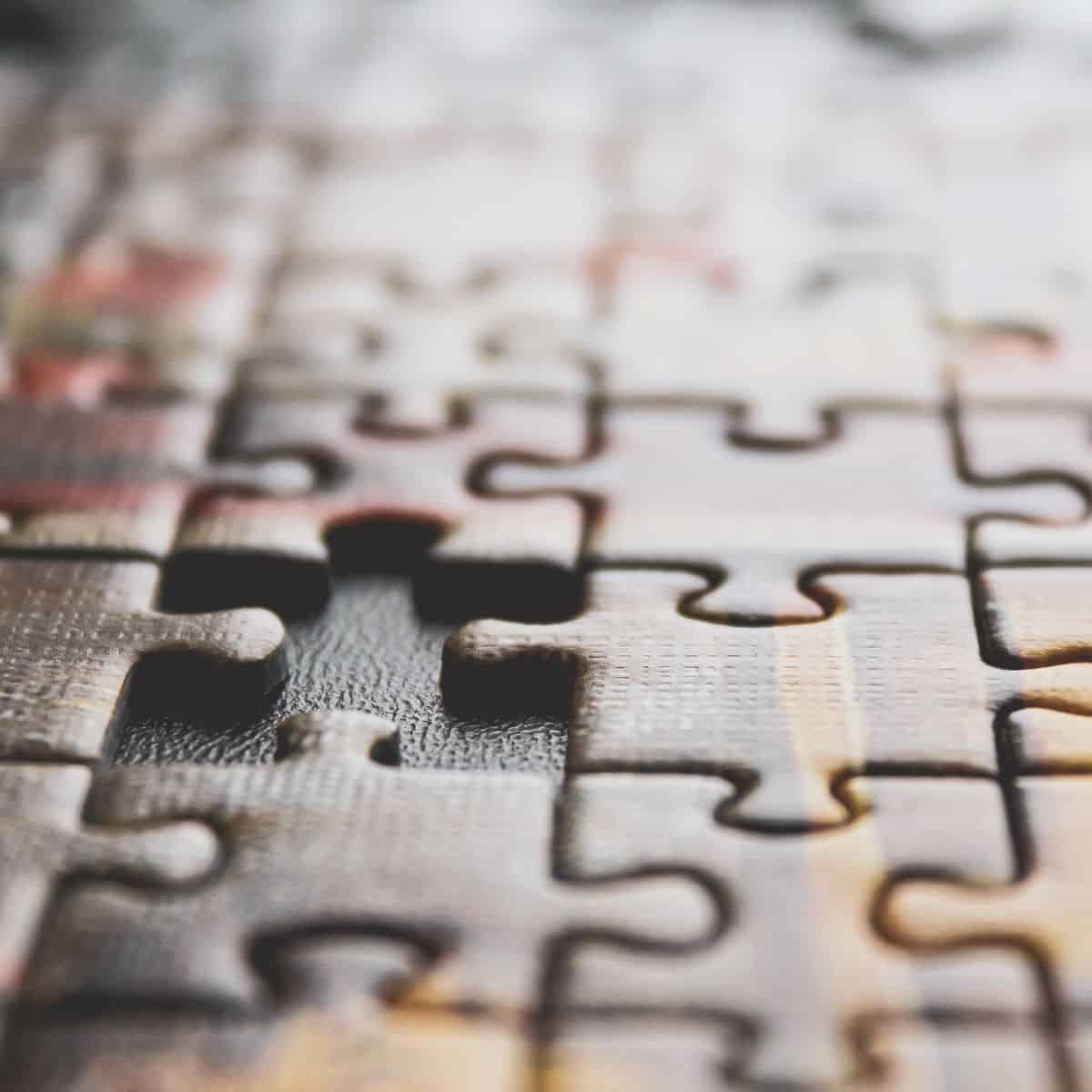

Do you know that wonderful feeling of 'getting lost' in a good puzzle?
We often classify puzzles as a lazy pleasure. However, the benefits of puzzling go beyond entertainment. Ongoing scientific evidence shows that puzzling is good for both your mind and body.
Have you been looking at your to-do list and feeling guilty about pausing to puzzle?
Consider the benefits of puzzling self-care.
Here's why you should make puzzling a part of your regular routine.
In a rush? Jump to the section of your choice or scroll to the very bottom for a quick summary of key points!
Benefits of Puzzles
Scientific research provides many reasons to make puzzling part of your day-to-day habit. Check out the health benefits of puzzling below.
1. Puzzling provides stress relief
The everyday stress of life can be overwhelming at times. Your neurobusy mind constantly racing with thoughts of work, family, and the 101 things on your to-do list for the day.
Your brain can’t effectively problem-solve 24/7. We all need periods of rest and disengagement to allow our brains to get back to peak functionality.
One of the benefits of puzzling is that it shifts your brainwaves to the jigsaw puzzle at hand, temporarily shelving those stressors.
"Puzzles are more than just a way to pass the time," Dr. Michelle McCoy Barrett, a licensed clinical psychologist, says. "Particularly during periods of high stress, becoming immersed in a puzzle can be like practicing a mindful meditation — relaxing your mind and body, decreasing stress, and even slowing your heart rate and lowering your blood pressure."
2. Puzzles reduce anxiety
The chaos you experience throughout the day may be beyond your control, making it beneficial to puzzle.
Concentrating on organizing the pieces by color and size is calming. Feeling control of the task helps settle racing thoughts and tabling anxiety. Solving puzzles can be a great mindfulness exercise that helps redirect your attention to the present moment.
By fully immersing yourself in puzzling, your brain enters a state of flow, similar to when you’re meditating. Not only does this lower your heart rate, but it can also help stop intrusive thoughts from running in loops, promoting a sense of calm.
According to Dr. Patrick Porter, a neuroscience expert, solving jigsaw puzzles for just 30 minutes a day for eight weeks can significantly decrease anxiety levels.
3. Puzzles are good for your brain
Are jigsaw puzzles good for your brain? Yes! Studies also suggest that jigsaw puzzles can improve visual-spatial processing, problem-solving skills, short-term memory, and slow cognitive decline as we age.
One of the benefits of doing puzzles is that it engages both sides of the brain, encouraging bilateral stimulation!
The left side of your brain focuses on patterns and sequences, while the right side works holistically at completing the whole picture.
This constant back and forth leads to a complete mental workout that builds and reinforces neural connections.
This bilateral stimulation creates electrical activity in different parts of the brain and encourages better long-term communication between the two sides of the brain.
Bonus: Puzzle benefits for the neurobusy
Many neurobusy people experience chronic overwhelm and have racing thoughts, leading to emotional dysregulation.
The inter-hemisphere brain communication puzzles encourage could be key to better focus, emotional processing, and regulation for neurobusy people.
One study showed a decreased stress response in the amygdala, the area of the brain that processes fear and other emotions, following bilateral stimulation.
In other words, the benefits of doing jigsaw puzzles may be a twofold form of meditative intervention for neurobusy people.
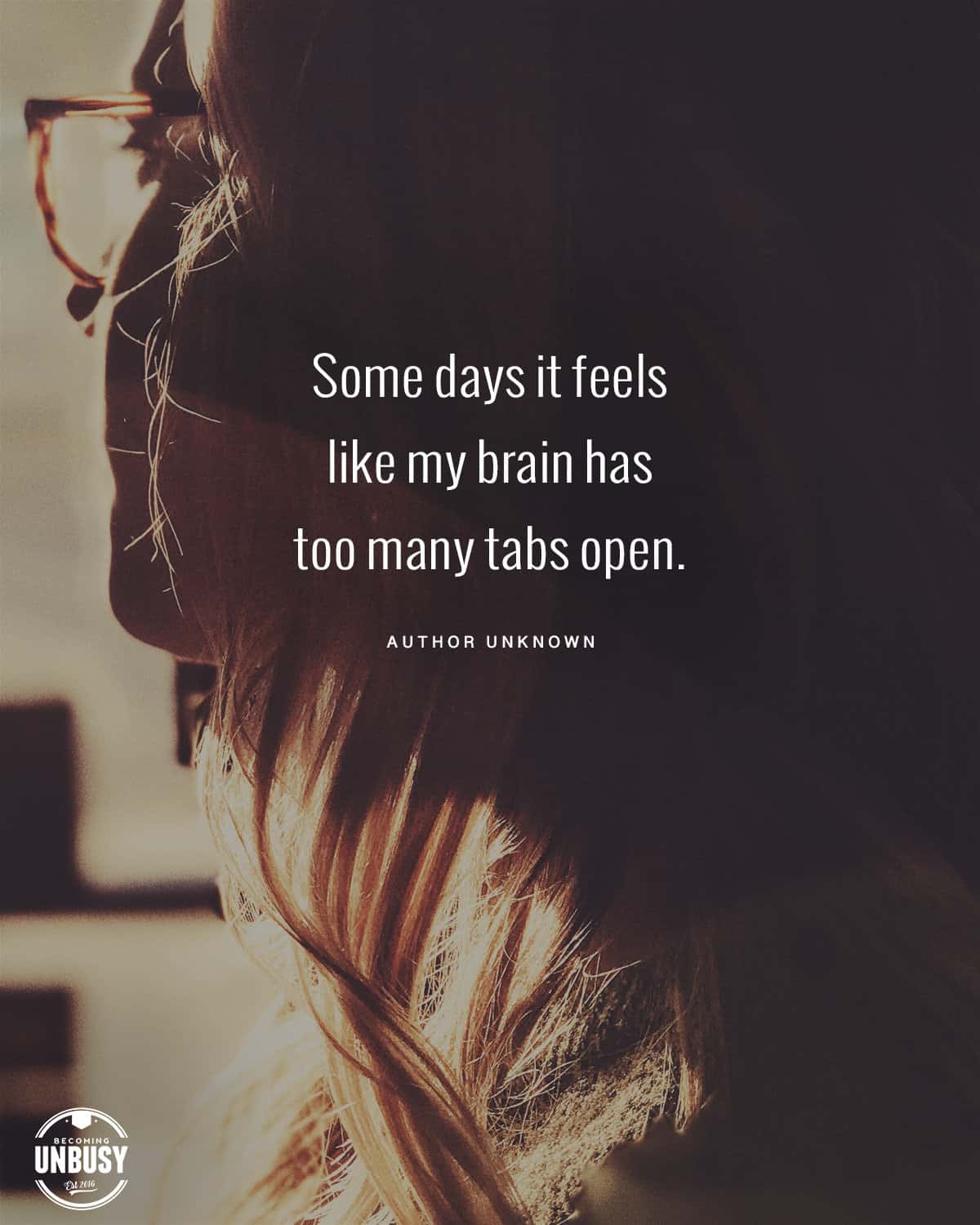
Authentically UnBusy
Here's the part where I admit that I used to hate puzzles. Not just dislike them, I despise them.
Instead of helping my family with a puzzle, I was the Chatty Cathy dancing around the table with my anxiety and to-do list, unable to slow down.
One evening, my teen asked me to sit and work on a puzzle with her — just the two of us. As always, I replied sweetly, "Thanks, but no thanks."
She went on with a mini-lecture about puzzles being a form of meditation. Then closed the deal with a sucker punch ... she used my own words against me; she went on with a spiel about "getting comfortable with being uncomfortable."
That night, we sat quietly together, working through the pieces.
It was magic.
And so began my love of jigsaw puzzles.
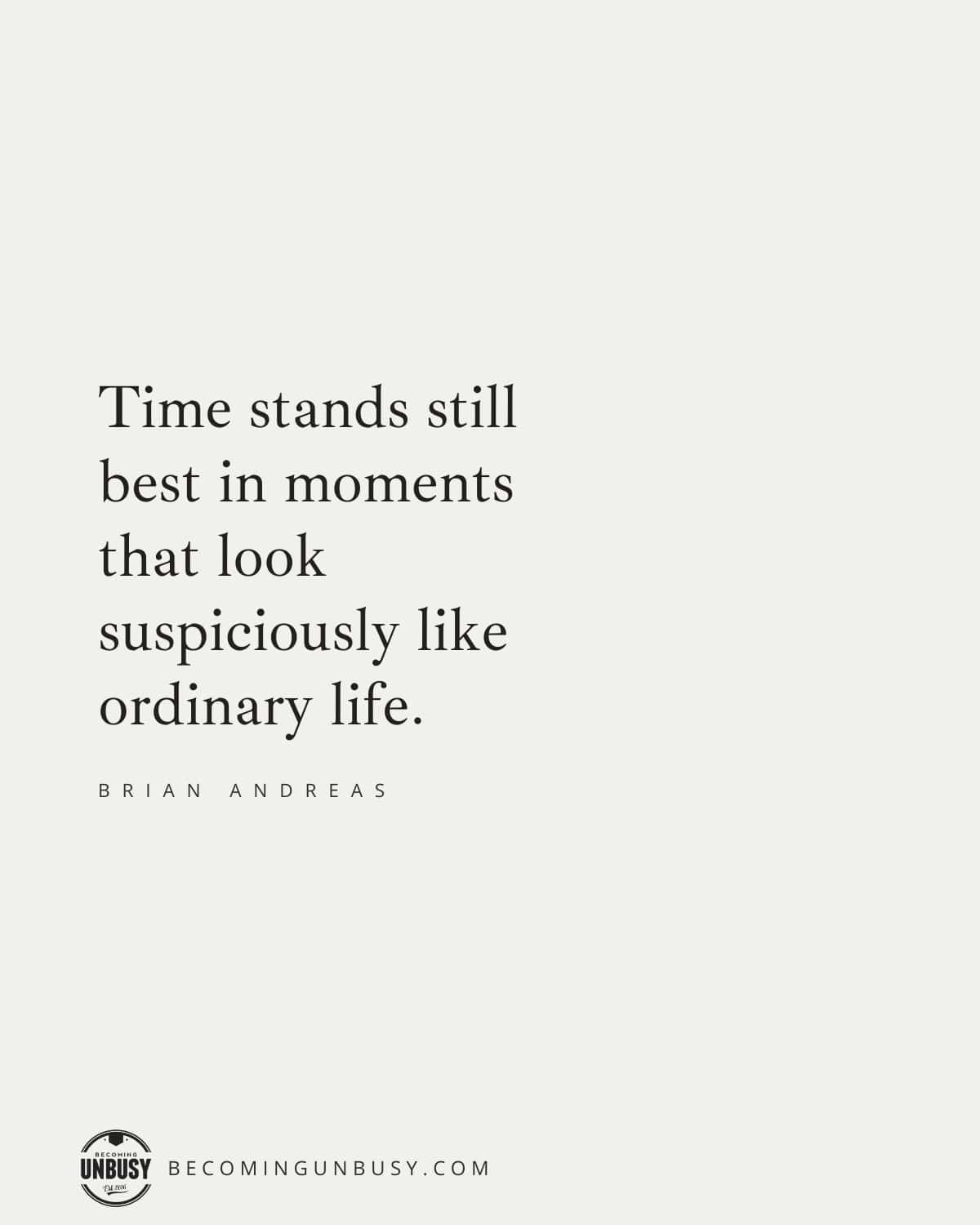
The absolute number one benefit of puzzles?
Puzzles make time stand still.
The more jigsaw puzzles we worked through, the more I saw how they could help people craft an intentional and unbusy life.
There are so many unexpected benefits of puzzles.
Unexpected Benefits of Puzzling
In today's fast-paced world, it's easy to get caught up in the hustle and bustle of everyday life. The constant demands of work, family, and other responsibilities can leave us chronically overwhelmed and stressed.
"Doing a jigsaw puzzle is an antidote for the constant state of overstimulation we all experience in today's chaotic world," explains Kaylin Marcotte, who uses puzzling as a form of nightly meditation.
"Setting down phones and getting away from screens to do a tactile activity that occupies your mind enough to feel attentive and present, without being too challenging or overwhelming, is the perfect balance of focus and calm," she notes.
The following benefits of puzzles for adults helps create that balance!
What are puzzles good for?
Puzzles have a variety of unexpected mental health perks you might not consciously even notice. Here are a few unexpected joys and benefits of doing jigsaw puzzles.
Puzzles are good for:
Creating A Sense of Control
Your nagging, neverending, out-of-control to-do list takes a backseat in your mind when you are puzzling. Instead, you are focused on the controllable problem right before you — the jigsaw puzzle.
With jigsaw puzzles, there are no twists and turns or sudden surprises. All of which give you a sense of control.
Unique Sensory Experience
If you are new to puzzles, you may not understand the sheer joy jigsaw people feel sorting through the pieces of a new puzzle.
Each puzzle is unique; some are matte, and some cuts are different. No two puzzles or pieces feel the same. Working through the pieces will stimulate your brain.
Puzzling is a quiet and gentle sensory experience. Working with your hands is one of many benefits of doing puzzles, it is a rewarding sensory experience.
Inspiring Introspection
Immersing yourself in completing a jigsaw masterpiece provides ample opportunities to get into a Zen state, allowing for deep introspection.
Daily meditation, in the form of puzzling, will assist in your mental well-being and health.
The Joy of Finishing
Putting in that last piece, the joy of finishing — it is so satisfying.
"It’s super gratifying for the mind, a kind of mental ASMR that’s activated by perfectly bringing something to completion," explains Le Puzz co-founders Alistair Matthews, and Michael Hunter.
"It's [also] a nice reminder that some things take time, and even things that look messy and disconnected can be solved if you take it piece by piece," adds Marcotte.
How to take advantage of the benefits of jigsaw puzzles
Juggling work, caregiving, and life may make it challenging to take time for yourself. You need to embrace the benefits of puzzles, my friend.
Imagine sifting through your puzzle pieces in a quiet, isolated part of your home. It may feel impossible, but again, even a few minutes a day has benefits.
Here are a few tips for getting started with the perks of puzzling:
- Pick a designated time for puzzling each day — perhaps a few minutes before bed or when you need help regulating between a transition.
- Gently let others know you are not to be interrupted when puzzling.
- Consider wearing noise-canceling headphones to block out distractions.
- If you've got your kids, keep a visual timer nearby so they know how long they must wait to interact with you again. *If interrupted, consider resetting your timer for the full amount again!
- Consider a jigsaw table or invest in a puzzle board with drawers that can be put away if you have limited space.
Perhaps, most importantly, pick a beautiful puzzle that is meaningful to you.
Personal Puzzling Q&A
Q: When do you usually puzzle?
A: Sometimes, after a long day, I like to sit for a few minutes and sort puzzle pieces before shifting into "mom mode." It allows my brain to reset. Otherwise, I generally tend to puzzle more regularly in the evening as an alternative to screen time. It is an activity I default to more in the year's colder months.
Q: Do you puzzle alone or with your family?
A: At our house, we have a puzzle sitting out that people can work on solo or together. That being said, there are definitely benefits to puzzling with people or alone. If time puzzling alone is what you need, my friend, insist on solitude.
Q: How have you made puzzling as a group a form of self-care?
A: As a group of introverts, we practice "community solitude" at our house. We have an agreement that if you join another person already puzzling, there is no talking aloud. For me, puzzling also usually involves a cup of tea (or a glass of wine), some essential oils defusing, and calming music.
Q: What if you don't have the space to just leave a puzzle out all the time?
A: Consider investing in a puzzle board with drawers that can be put away with limited space. On a personal note, we've also found that having a puzzle out helps keep our dining room table from becoming a clutter drop zone!
Q: What kind of puzzles do you recommend?
A: We are obsessed with 1000-piece Cavallini vintage puzzles. They're high quality and beautiful. I love that there are multiple individual "wins" in each design, allowing you to feel a sense of accomplishment as you work through it. Check out this list of top recommended 1000-piece puzzles to help you unwind.
UnBusy benefits of doing puzzles
Most people looking to become unbusy are either struggling with chronic overwhelm or undergoing a life transition.
"During stressful times, things that give you a sense of control, no matter how small, have a calming effect on the mind," explains Dr. Barrett, a licensed clinical psychologist.
When you're present and focused on a puzzle, it provides a much-needed moment of peace ... a moment of unbusy. You deserve that.
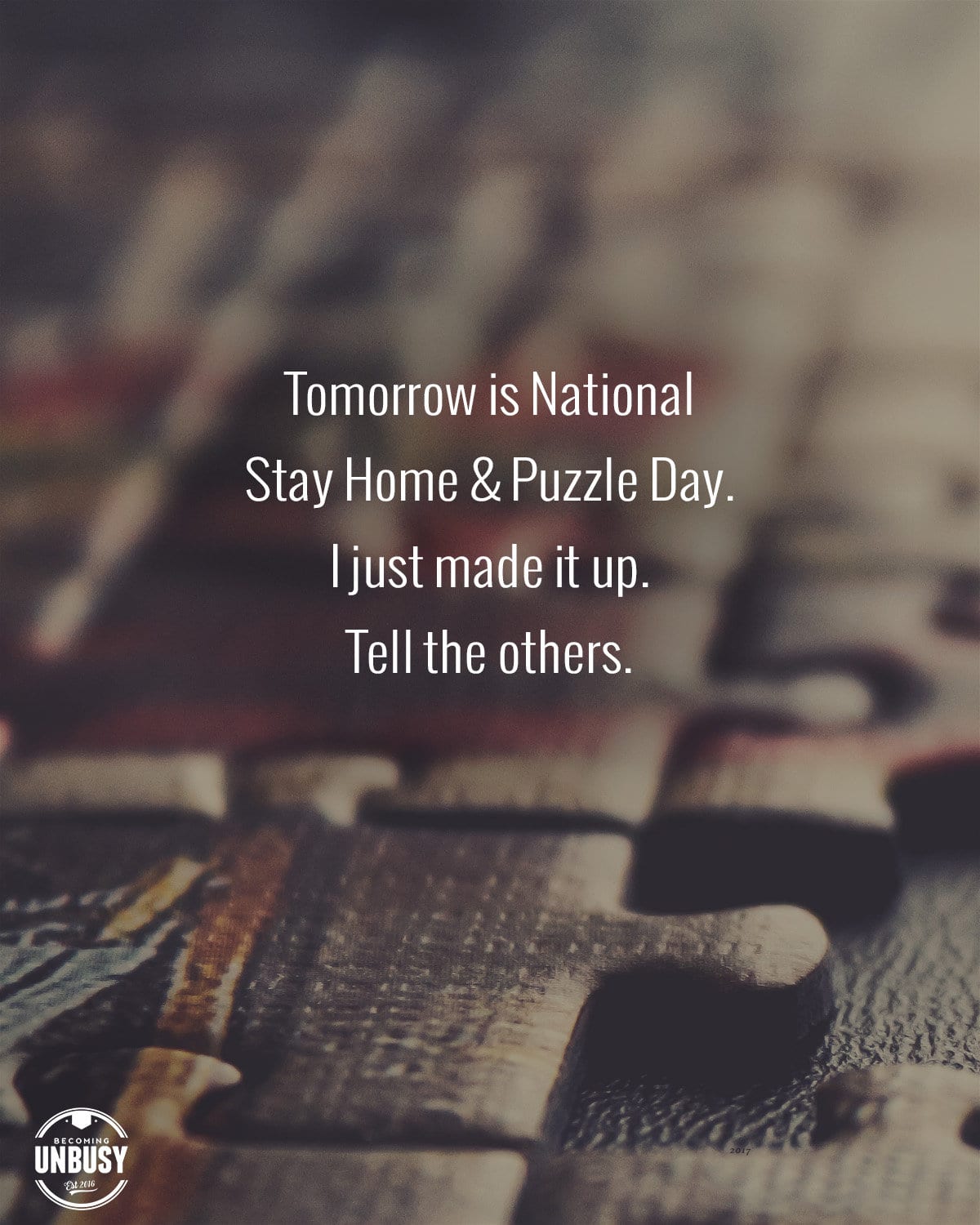
Dive Deeper
Looking for other ways to become unbusy? Dive deeper with these resources.
Key Points
- During periods of high stress, becoming immersed in a puzzle can be like practicing a mindful meditation — relaxing your mind and body, decreasing stress, and even slowing your heart rate and lowering your blood pressure.
- By fully immersing yourself in puzzling, your brain enters a state of flow, which can help stop intrusive thoughts from running in loops, promoting a sense of calm.
- Puzzles are good for your brain. Studies suggest that jigsaw puzzles can improve visual-spatial processing, problem-solving skills, short-term memory, and slow cognitive decline.
- Puzzles engage both sides of the brain, encouraging bilateral stimulation. The inter-hemisphere brain communication could be key to better focus, emotional processing, and regulation for neurobusy people.
- Puzzles are great for creating a sense of control, a unique sensory experience, inspiring introspection, and experiencing the joy of finishing.
- Making time for self-care or puzzling feels impossible, but even with a few minutes a day, the benefits of puzzles can help you find unbusy.






